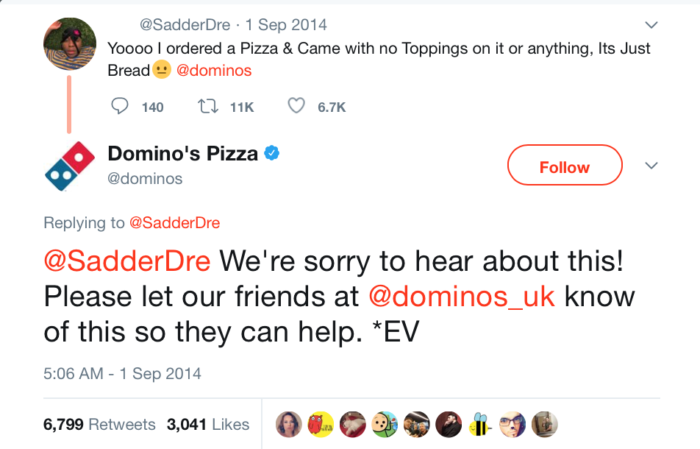If you know that social media is important to your brand, but you can’t figure out how to use it, this is the article for you. Consumers expect us to act a certain way, and if you haven’t cracked the code yet, your brand could suffer.
The rise of brand presence on social media has also made it hard to break out. Figuring out what consumers want from you is a great way to gather positive attention and build your brand.
How Consumers Want Brands to Act on Social Media
As of 2011, 50% of social media users follow their favorite brands on social media. That’s a pretty big market.
So the question becomes, how do they want you to act? How can you act to retain social media followers and maybe attract more?
This is what we found through our research:
Be Honest on Social Media
It should come as no surprise that the number one thing that people want from their brand on social media is honesty. Following several long years of economic turmoil, consumers are demanding a more open and honest relationship with the brands they use.
Already, brands have to compete with the leftover cynical behavior following our economic crash. A Cohn & Wolfe study found that just 3% of Americans, Brits, French, Italians, Spanish, and Swedes say they believe that big businesses are honest and transparent. That’s a pretty harsh number.
In the days we live in, where social media and the internet are every where, it is important to assume that 1) someone somewhere is doing something wrong, and 2) it will be made public by someone on social media.
With this being our reality, honesty is no longer just an option. It is a necessity. If you don’t decide on your own, to be honest, someone else will decide for you, with devastating results.

A great example of this is the Edward Snowden Effect. Edward Snowden worked for the CIA and as a contractor for the United States Government. He also copied and leaked information from the NSA in 2013 without authorization. Furthermore, he continues to post his revelations using social media giants like Twitter as his stage.
The Edward Snowden Effect works as such: someone posts sensational revelations about brands and consumers jump ship and punish these brands.
To avoid falling into the trap, there are a few simple standards your brand needs to follow:
- Have values and morals. Stand by them no matter what challenges come up.
- Be true to your mission and values.
- Honestly divulges your practices, whether they be positive or negative.
- Be willing to show your flaws.
- Own up to your mistakes and be honest with customers. Don’t sugar coat anything or sweep problems under the rug.
- Do what you say you’re going to do.
Be Active on Social Media
95% of millennials expect brands to have a Facebook presence. It’s not just the younger generations though. 87% of people aged 30-44 and 70% of people aged 45-60 think brands should have a Facebook page. Consumers expect their brands to be available on social media.
The impact of being active on social media can be dramatic. According to Kim and Ko in a 2010 study, 1/3 of survey participants posted their opinions about products on a brand’s blog, and 36% thought more positively about companies that had blogs.
In a study by DEI Worldwide in 2008, they found that 70% of consumers visit social media sites to get information on the brand, 49% make a purchase decision based on the information they find, and 60% say they’ll use social media sites to pass information on to others.
Thus, companies that are not engaging in social media are missing out on a big opportunity to reach their customers. The value of one customer is worth far more than just their initial purchase because they will pass on information about your brand to others using social media.
Forbes said about social media involvement:
The rewards for companies and brands are potentially great. Their payoff is the opportunity to become what I call “brand nations” — a new model of business whose market is composed of consumers throughout the world, regardless of their geographic location or nationality, who believe and trust in that brand based on shared values and socially responsible behaviors. These will be brands that customers anywhere in the would will demonstrate and encourage loyalty to, using Twitter, Facebook, FourSquare, and other social media tools that now empower them to make or break a brand.
SEE ALSO: Digital Brand Management in 30 Minutes a Day
Be Supportive on Social Media

Just like consumers want brands to be active on social media, they also want them to be supportive. Consumers want brands to respond to questions, join conversations, and talk about timely events.
An Edison Research study found that 42% of consumers expect a response in under an hour. Additionally, 25% want a response in the same day, and 9% in just 5 minutes!
Being supportive on your social media page creates a bond with your consumer. While you may not consistently answer a question in under 5 minutes, if you answer concerns relatively quickly, you will form a bond that is not easily shaken.
In their 2014 State of MultiChannel Customer Service report, researchers at a Microsoft company named Parature found that out of the 1,000 customers they talked to, 35% had asked a customer service question on social media. Of this 35 %, 51% said that they had a more favorable view of the brand after getting their response.
A smart brand will use their consumer’s comments, compliments, and any criticisms on their social media pages to strengthen their brand’s image.
To do this, it is important to provide an easily accessed customer service communication channel using social media. This will also build your brand’s credibility.

This tweet conversation is a great example of a brand (Dominos) showing their support for their consumers. They respond quickly and want to help change the experience that their customer is having. As an added bonus, Dominos receives a lot of positive social media support for their tweet. Do you see all the likes and retweets? That’s a lot of positive movement because of an early response to a consumer complaint.
Being supportive may not always mean that it costs you something (although this example does imply that). However, you will have a big impact depending on how you decide to react. Be supportive and kind. Remember the golden rule from elementary school? Now is the time to use it. Do unto others as you would have them do unto you.
SEE ALSO: 4 Reasons Why Consumers View Brands As Relationships
Have a Lack of Sales Pitches on Social Media
People don’t go to social media because they want to be promoted to. They flock to social media sites to gain a connection. Your brand is an important part of that, and you should feel flattered that people want you to join them where they go for connections and fun.
AdEspresso found that only 20% of Facebook posts create an emotional response from consumers, while 0% of ads did. You read that right. Even a well thought out post may only affect 20% of your viewers, and none of your ads will touch them.
In the same vein Gallup found that,
These channels do not motivate prospective customers to consider trying a brand or recommending a brand to others. Therefore, if companies want to acquire new customers, their best bet is to engage their existing customers and inspire them to advocate on their behalf. Customer engagement drives social engagement — the degree to which consumers will work for or against an organization within their social networks — not the other way around.
You don’t need to post constant sales pitches to your consumers. Post relevant content that they like and they will do the rest for you.
Keep your content fun and light when you use social media, focus on making a connection with your consumers.

Notice that this post by Bloomsbury Publishing has nothing really to do with books. They aren’t trying to peddle their latest book but instead sharing a fun craft that their office did to celebrate the season.
Because this post isn’t trying to sell, it is more likely to be shared and appreciated by their consumers. This will mean better business for them later.
Remember what your consumers are looking for on social media when they stop by your brand. Utilize social media in the same way that they want to use it. This will build your consumer connection and profit you better in the long run than a stream of ads would.
Final Thoughts
Remember that social media is a place where people go to feel a connection. Just like if you were dating your consumer, you need to remember to be honest about your brand. This is the number one rule, so don’t forget it!
You also need to be active and supportive on social media for your audience. Activity builds trust and support creates an emotional tie to your brand.
Finally, remember to keep your sales pitches to a minimum. Offer something more than just your products to your consumers. While they may love your product, they may love it less if they feel like you’re constantly shoving it down their throat. Be light, be fun, be a friend!
What brands are you following on social media?











